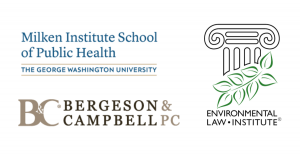ELI, B&C, and GWU Virtual Conference 'TSCA Reform -- Nine Years Later' Opens Complimentary Registration
A stellar faculty of speakers from government, non-governmental organizations, industry, and academia will convene to discuss pressing issues related to TSCA.
Full Agenda (subject to change):
All times Eastern.
June 25, 2025
8:30 a.m. - 8:35 a.m.
Welcome Remarks
Madison Calhoun, Senior Manager, Educational Programs, Environmental Law Institute
8:35 a.m. - 9:00 a.m.
Setting the Stage -- An Overview of Today’s Program
Nine years after enactment of Lautenberg, who would have guessed its implementation and the state of chemical safety remain the subject of considerable uncertainty and legal debate. This discussion will set the stage for a day of stimulating but respectful debate on the state of TSCA play and the big issues that remain unresolved.
Lynn L. Bergeson, Managing Partner, Bergeson & Campbell, P.C.
Robert M. Sussman, Principal, Sussman & Associates
9:00 a.m. - 10:00 a.m.
Panel 1: Risk Management
All five final risk management rules are being litigated, and the new Administration’s approach to risk management is expected to change. This panel discussion will address the common elements of these five final rules, cross-cutting and key legal and policy issues in dispute, offer a litigation update and timetable for judicial decisions, speculate on what the U.S. Environmental Protection Agency (EPA) should do differently in future rules, and discuss the Workplace Chemical Protection Program’s (WCPP) alignment with Occupational Health and Safety Administration (OSHA) requirements.
Robert M. Sussman, Principal, Sussman & Associates, Moderator
Keith Bradley, Partner, Squire Patton Boggs
Ryan J. Carra, Ph.D., Principal, Beveridge & Diamond, P.C.
Jonathan Kalmuss-Katz, Staff Attorney, Earthjustice
Randy S. Rabinowitz, Executive Director, OSH Law Project, LLC
10:00 a.m. - 11:00 a.m.
Panel 2: Risk Evaluation
EPA is revisiting the foundational underpinnings of the 2024 Risk Evaluation Procedural Framework rule, and there is considerable uncertainty on how EPA will approach upcoming risk evaluations. This panel will explore the interplay between the D.C. Circuit case and risk management litigation, review recent draft formaldehyde and butadiene risk evaluations, discuss key cross-cutting issues, identify key science issues, and discuss the prioritization and scoping processes.
Mark N. Duvall, Principal, Beveridge & Diamond, P.C., Moderator
Rashmi Joglekar, Ph.D., Associate Director of Science & Policy, University of California San Francisco, Program on Reproductive Health and the Environment
M. Andrew Maier, Ph.D., Principal Health Scientist, Integral Consulting Inc.
Tosh Sagar, Senior Attorney, Earthjustice
Karyn M. Schmidt, Partner, Squire Patton Boggs
11:15 a.m. - 12:15 p.m.
Panel 3: New Chemical Review
New chemical review remains a particularly hot topic, and EPA has implemented many changes and devoted considerable energy to addressing concerns and accelerating the process. This panel will provide an update on metrics and approaches, discuss premanufacture notice (PMN) completeness/supplemental submissions/rework, the approach to Significant New Use Rules (SNUR), confidential business information (CBI) issues, and adequacy of resources.
Greg Schweer, Principal, Environmental Consulting, LLC, Moderator
Kyla Bennett, Director of Science Policy; Northeast & Mid-Atlantic Director, Public Employees for Environmental Responsibility
Lawrence E. Culleen, Partner, Arnold & Porter Kaye Scholer, LLP
Maria J. Doa, Ph.D., Senior Director, Chemical Policy, Environmental Defense Fund
Richard E. Engler, Ph.D., Director of Chemistry, Bergeson & Campbell, P.C.
12:15 p.m. - 1:15 p.m.
Lunch and Keynote Address: TSCA Implementation: An EPA Perspective
Introduction by Lynn R. Goldman, M.D., M.S., M.P.H., Michael and Lori Milken Dean of the Milken Institute School of Public Health; Professor of Environmental and Occupational Health
Remarks by Nancy B. Beck, Ph.D., Principal Deputy Assistant Administrator, EPA Office of Chemical Safety and Pollution Prevention
1:15 p.m. - 2:15 p.m.
Panel 4: Plastics Production, Use, and Recycling: Key TSCA Considerations
Plastic production use and disposal is a global issue garnering significant interest. This panel will explore key TSCA issues including platform chemicals and precursors, additives, and intermediates, public health concerns, microplastics, the scope of TSCA risk evaluations, advanced recycling, PMN/SNUR requirements for pyrolysis oils, and more.
Martha E. Marrapese, Partner, Wiley Rein LLP, Moderator
Ross Eisenberg, President, America’s Plastic Makers™
Eve C. Gartner, Director of Crosscutting Toxics Strategies, Earthjustice
Jeff Gold, Founder and CTO, Nexus Circular
Jessie M. Kneeland, Ph.D., Principal Scientist, Gradient® Corporation
Renee Sharp, Director, Plastics and Petrochemical Advocacy, Environmental Health, Natural Resources Defense Council
2:30 p.m. - 3:15 p.m.
Panel 5: Chronic Disease: What Role Chemicals Play
This point and counterpoint discussion will address the role chemicals play in chronic disease.
Lynn R. Goldman, M.D., M.S., M.P.H., Michael and Lori Milken Dean of the Milken Institute School of Public Health; Professor of Environmental and Occupational Health, Moderator
Linda S. Birnbaum, Ph.D., D.A.B.T., A.T.S., Scientist Emeritus and Former Director National Institute of Environmental Health Sciences and National Toxicology Program; Scholar in Residence, Nicholas School of the Environment, Duke University
Paolo Boffetta, M.D., M.P.H., Stony Brook Cancer Center
3:15 p.m. - 4:15 p.m.
Panel 6: TSCA Reform Redux: Change Beyond Fee Reauthorization?
The TSCA community is buzzing with the prospect of TSCA legislative reform occasioned by the 2026 lapsing of TSCA’s fee authorization. Stakeholders are divided on whether we need to reopen TSCA and, if so, whether fine tuning or extensive revisions are needed. This panel will consider how well the law is working, what changes are under consideration, and what happens if nothing happens.
Daniel Savery, Senior Legislative Representative, Earthjustice, Moderator
Jerry Couri, Senior Policy Director, American Fuel & Petrochemical Manufacturers
Liz Hitchcock, Director, Federal Policy Program, Toxic-Free Future
Daniel Rosenberg, Director, Federal Toxics Policy, Environmental Health, Natural Resources Defense Council
Kimberly Wise White, Ph.D., Vice President, Regulatory and Scientific Affairs, American Chemistry Council
4:15 p.m. - 4:30 p.m.
Concluding Remarks and Adjournment
Jordan Diamond, President, Environmental Law Institute
For complimentary registration, and to view all event speakers, visit the ELI registration page: https://www.eli.org/events/tsca-reform-nine-years-later
Emily Scherer
Bergeson & Campbell, P.C.
+1 202-557-3828
email us here
Legal Disclaimer:
EIN Presswire provides this news content "as is" without warranty of any kind. We do not accept any responsibility or liability for the accuracy, content, images, videos, licenses, completeness, legality, or reliability of the information contained in this article. If you have any complaints or copyright issues related to this article, kindly contact the author above.
CCS Ranks on the 2025 Inc. 5000 List of America’s Fastest-Growing Private Companies
Smart Home Search Comes to Michigan: Houzeo Rolls Out Intelligent Tools for House Hunters
Smarter Home Search Comes to Colorado as Houzeo Launches 'Save Search' and Custom Alerts
Więcej ważnych informacji
 Jedynka Newserii
Jedynka Newserii

 Jedynka Newserii
Jedynka Newserii

Farmacja

Nowy pakiet farmaceutyczny ma wyrównać szanse pacjentów w całej Unii. W Polsce na niektóre leki czeka się ponad dwa lata dłużej niż w Niemczech
Jeszcze pod przewodnictwem Polski Rada UE uzgodniła stanowisko w sprawie pakietu farmaceutycznego – największej reformy prawa lekowego od 20 lat. Ma on skrócić różnice w dostępie do terapii między krajami członkowskimi, które dziś sięgają nawet dwóch–trzech lat. W Unii Europejskiej wciąż brakuje terapii na ponad 6 tys. chorób rzadkich, a niedobory obejmują również leki ratujące życie. Nowe przepisy mają zapewnić szybszy dostęp do leków, wzmocnić konkurencyjność branży oraz zabezpieczyć dostawy.
Handel
Wzrost wydobycia ropy naftowej nie wpłynie na spadek cen surowca. Kierowcy jesienią zapłacą więcej za olej napędowy

Sierpień jest trzecim z rzędu miesiącem, gdy osiem krajów OPEC+ zwiększa podaż ropy naftowej na globalnym rynku; we wrześniu nastąpi kolejna zwyżka. Kraje OPEC, zwłaszcza Arabia Saudyjska, chcą w ten sposób odzyskać udziały w rynku utracone na skutek zmniejszenia wydobycia od 2022 roku, głównie na rzecz amerykańskich producentów. Nie należy się jednak spodziewać spadku cen ropy, gdyż popyt powinien być wysoki, a pod znakiem zapytania stoi dostępność ropy z Rosji. Nie zmienia to faktu, że jesienią ceny paliw na stacjach zazwyczaj rosną, a w największym stopniu podwyżki dotyczyć będą diesla.
Nauka
Szacowanie rzeczywistej liczby użytkowników miast dużym wyzwaniem. Statystycy wykorzystują dane z nowoczesnych źródeł

Różnica między liczbą rezydentów a rzeczywistą liczbą osób codziennie przebywających w Warszawie może sięgać nawet niemal pół miliona. Rozbieżności są dostrzegalne przede wszystkim w dużych miastach i ich obszarach funkcjonalnych. Precyzyjne dane populacyjne są tymczasem niezbędne w kształtowaniu usług społecznych i zdrowotnych, edukacyjnych, opiekuńczych, a także w planowaniu inwestycji infrastrukturalnych. W statystyce coraz częściej dane z oficjalnych źródeł, takich jak Zakład Ubezpieczeń Społecznych, są uzupełniane o te pochodzące od operatorów sieci komórkowych czy kart płatniczych.
Partner serwisu
Szkolenia

Akademia Newserii
Akademia Newserii to projekt, w ramach którego najlepsi polscy dziennikarze biznesowi, giełdowi oraz lifestylowi, a także szkoleniowcy z wieloletnim doświadczeniem dzielą się swoją wiedzą nt. pracy z mediami.









.gif)

 |
| |
| |
|